This is a story of Muslim-Jewish romance and it is worth reading and reflecting. The article “How a Muslim-Jewish romance shaped one of India’s biggest pharma giants” is the courtesy of Dawn News Paper and is appended below with gratitude. It has all the elements of harmony, and the efforts of individuals to build cohesive societies.
Interfaith romance and marriages have been around for ever, thank God, they have become common in the United States. Nearly 40% of the marriages are interfaith and interracial, and 50% of of Jewish marriages are interfaith. Our nation will continue to lead the world in accepting the otherness of other religions, cultures, politics and ethnicities and I pray other nations follow us.
To paraphrase Goethe, “Once you are committed to an idea or an act, all sorts of things will occur to help one that would never otherwise have occurred.” This wisdom has been a source of inspiration to me, somehow I stumble into articles on building cohesive societies in a variety of ways.
This man’s mission is inspiring and what he has done in social and religious pluralism is admirable. As a Muslim myself, I am deeply committed to building cohesive societies and I will do my share of work in building bridges between the communities, particularly between Jews and Muslims, Jews and Christians, Hindus and Muslims and Hindus and Abrahamic traditions.
If Muslims and Jews can work on producing a sense of security to Israelis and Justice to the Palestinians, most of the conflicts will fade and solutions emerge. All they have to do is drop their non-nonsensical thoughts they harbor about getting even with the other, showing who has the upper hand, and proving the other to be wrong… and simply focus on looking in the eyes of each others’ children and make a commitment – I will not dump our problems on you, and I will not make life difficult for you when you grow up. I will do all I can to make your life better than we had so you guys can live in harmony. We will work on teaching you to eat, drink, school and play together to create a society we want. Before 1948, Jews and Muslims were each others sanctuaries and safety nets, we can do it again and create an exemplary world for all humanity to live in harmony.
As we get the funding, we will have a research arm for every faith from Atheism to Zoroastrianism and every one in between. We will be holding training classes in summer for one to be a Pluralist – i.e., one who respects the otherness of others and validates the uniqueness of the other without diminishing his own political, religious, social or cultural tradition. We have many programs to accomplish that and we invite supporters to run the program in their name.
I hope to go on a tour in the US, listening and talking about building a cohesive America, where we appreciate the otherness of others and accept the God-given uniqueness of each one. Quran guides Muslims to be inclusive and build cohesive societies with pluralism as its foundation, and I hope we can reach out to those few Muslims who did not get that message.
At the center for pluralism we continue to research on all aspects of Pluralism; politics, religion, society and culture. I have a lot of admiration for interfaith and inter-racial couples for they are setting the new standards of harmony around the world.
Enjoy the article now and let me know if you did.
You can find more articles like this at www.PluralismNews.com a part of the Center for Pluralism.
Thank you.
Mike Ghouse
Mike@CenterforPluralism.com
www.CenterforPluralism.com
www.InterfaithMarriages.org
How a Muslim-Jewish romance shaped one of India’s biggest pharma giants
Courtesy Dawn.com, January 27, 2016
In 1992, the editor of The Times of India telephoned one of Mumbai’s most prominent businessmen, Yusuf K Hamied. The editor asked Hamied, “as a Muslim leader” his opinion on communal riots that were taking place in the city.
Hamied replied: “Why aren’t you asking me as an Indian Jew? Because my name is Hamied? My mother was Jewish!” His maternal grandparents had perished in the Holocaust.
 |
| KA Hamied and Luba Hamied. |
Hamied, the chairman of one of India’s largest pharmaceutical firms, Cipla, is the son of an aristocratic Muslim scientist from India and a Jewish Communist from what is now Lithuania.
Defined by his parents’ extraordinary marriage, he unites his father’s scientific skills, business acumen, and Indian patriotism with his mother’s compassion for the less fortunate.
He charges the Western pharmaceutical industry with “holding three billion people in the Third World to ransom by using their monopoly status to charge higher prices,” and has devoted himself to making life-saving inexpensive generic medications for the inhabitants of poorer countries.
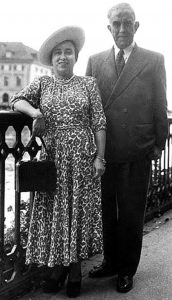 |
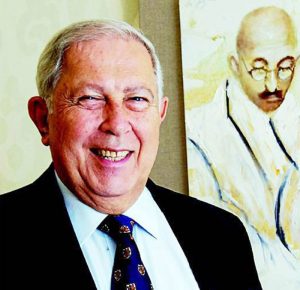 |
| Yusuf K Hamied: Maker of generic life-saving medications and scourge of the giant multi-national pharmaceutical houses |
Yusuf’s father: Khwaja Abdul Hamied (1898 – 1972)
Yusuf Hamied’s father, Khwaja Abdul (K.A.) Hamied, was born in Aligarh. His paternal grandfather Khwaja Abdul Ali (1862-1948) traced his lineage through spiritual guides to the Mughal emperors of India back to Khwaja Ubaidullah Ahrar (1403-1490), a great Naqshbandi Sufi in Uzbekistan.
His mother, Masud Jehan Begum (1872-1957), came from the family of Shah Shuja ul-Mulk, the pro-British Amir of Afghanistan (1803-1809 and 1839-1842), whose family fled to India after his assassination in an anti-British uprising. Khwaja Abdul Ali’s uncle was Sir Syed Ahmed Khan (1819-1898), the great Muslim educational and social reformer.
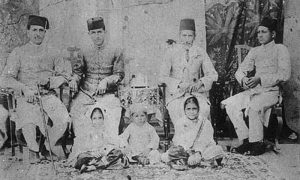 |
| KA Hamied with his his father, brothers, nieces, and son Yusuf. |
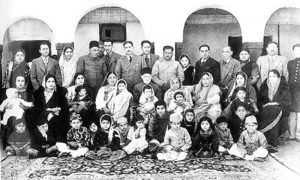 |
| The family of KA Hamied |
Khwaja Abdul Ali entered the judicial service of the British government in India, but his son KA Hamied passionately opposed “the evils of foreign rule”. When Mahatma Gandhi’s Non-cooperation Movement called for a boycott of government-run educational institutions, Hamied organised a strike at his school, Muir Central College. As a result, he was expelled from the university, then arrested when he tried to disrupt graduation ceremonies.
Hamied then returned to Aligarh, where Muslim nationalist leaders founded a new university, Jamia Millia Islamia, which refused government funding. Hamied taught chemistry there. He also supervised the production and sale of khadi, or homespun cloth, which Gandhi had made a central element of Indian nationalism. At his maternal uncle’s home, he first met Gandhi as well as Motilal Nehru and his son Jawaharlal.
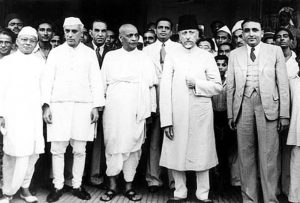 |
| KA Hamied was active in Indian Political affairs throughout his life |
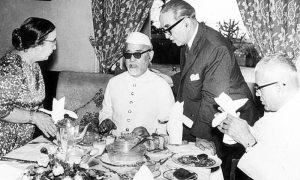 |
| KA and Luba Hamied with his good friend Zakir Hussain (second from left) who became President of India |
While teaching at Jamia, KA Hamied began a lifelong friendship with Zakir Husain, who went on to become the President of India. Hamied and Hussain later left for Germany to pursue graduate studies. Hamied studied with one of the world’s leading chemists, Professor A Rosenheim.
Yusuf’s mother: Luba Derczanska (1903 – 1991)
One day in 1925, Hamied joined some friends on a lake cruise near Berlin. One of the passengers on the boat was a young woman named Luba Derczanska. Luba was born in Wilno in Russian Poland (now Vilnius, Lithuania) and had come to Berlin to study. From their first meeting, the romance between Abdul Hamied and Luba Derczanska blossomed.
In 1928, Hamied married Luba in Berlin’s only mosque, and the following year they were again married in the Choral Synagogue in Wilno and the marriage was “solemnised” at a Register Office in London.
Footprints: In defiance of bigoted times
Luba was active in Communist circles in Berlin, and sought to bring her Indian beau into the movement: the first gift that she ever gave Hamied was a postcard of Lenin and for a time the couple were regulars at party meetings (later in life, Hamied had very strong reservations and concerns about Communism). Hamied was a prominent member of Indian revolutionary circles in India.
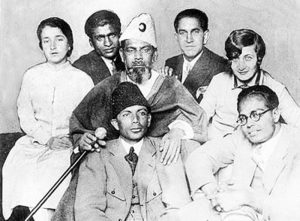 |
| Berlin, 1928: KA Hamied and Luba with Maulana Mahommad Ali (trademark crescent on his hat), the leader of the Khilafat Movement. |
Their parents were open-minded and welcoming, and the warmth with which Luba’s parents Rubin and Paulina greeted Hamied on his first visit to Wilno was matched by the welcome extended to Luba by Abdul Ali and Masud Jehan when she went to Aligarh.
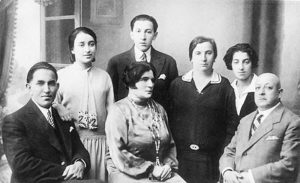 |
| The Hamieds with Luba’s family in 1929. In the centre are Luba’s brother Zorach and aunt. Zorach Derczanski came to India in 1934. The aunt came to India in 1938 and was joined there in 1946 by her non-Jewish husband Arthur Taenzler, a German flying ace in World War I. |
Their son Yusuf was born in Wilno during his parents’ last visit there before the Holocaust. Yusuf is the Arabic form of the Hebrew name Joseph. It was the name of Luba’s grandfather, and hence pleasing to her family, as well as the first name of the Polish president, Józef Piłsudski, and so flattering to the Hamieds’ Polish friends. A month after his birth, Yusuf’s parents took him back to Bombay.
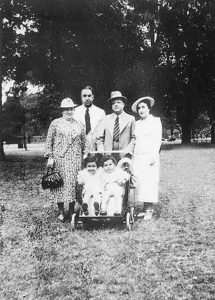 |
| The Hamieds with her Jewish parents and their children – Yusuf and Sophie. |
 |
| Yusuf and Sophie with their paternal grandmother Masud Jehan Begum, who descended from the family of Amir Shuja ul-Mulk of Afghanistan. |
Though Luba was not an observant Jew, her son Yusuf chose to memorialise her in the most active Indian synagogue. He heavily supported the reconstruction of the Shaar Hashamaim Synagogue in Thane.
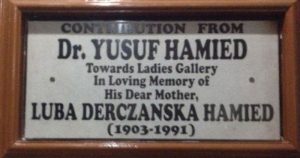 |
| Shaar Hashamaim Synagogue in Thane. |
Religious views
KA Hamied defined himself as an Indian who happened to be a Muslim, and he became openly hostile to the Muslim League. He rejected the notion that Hindus and Muslims were “separate nations” as Muhammad Ali Jinnah argued. Unlike his brothers, who opted for Pakistan, he always hoped for reconciliation in India between Hindus and Muslims.
Take a look: Karachi’s ‘Yahoodi Masjid’
In a speech to the Inter-Religious Seminar in Delhi on October 18, 1971, KA Hamied said that the “study of religion is my special hobby” and that “the basic attributes of this mysterious power, by whatever name we call it, are the same in all religions.” He said that “an ideal man must be a good man by virtue of his actions in society (and) may belong to any religion so long as he follows the tenets of his religion”.
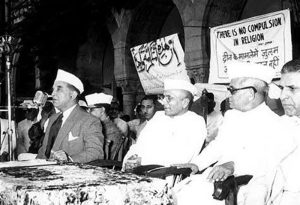 |
| KA Hamied believed that there should be “no compulsion in religion”. |
Hamied always enthusiastically urged a partnership between Jews and Muslims. He loved to talk about Islamic Spain, where Jews and Muslims had joined to create a golden age, and once said that “if the Jews, with their wealth, knowledge and scientific skill and Arabs made a common cause, they would have a strong empire covering West Asia and the entire coast of South Mediterranean”.
He always emphasised that “the Arabs and Israelis should see the necessity of getting out of this whirlpool of Russian and Western power politics” and “sit together at a round table conference away from Western powers to thrash out their differences and carve out a new future based on ancient friendship, alliance and mutual regard”.
The Holocaust
He regularly visited Germany, where he had many friends, as well as business dealings. Once, the Germans mistook him for a Jew and insulted him. He foresaw something far worse than discrimination and insults, and urged his Jewish friends to leave Germany. They insisted that as members of the intellectual élite, they had nothing to worry about.
The horrors of the Holocaust were to touch Hamied and Luba directly. In June 1941, Nazi troops occupied Wilno, and almost immediately began the extermination of the city’s Jews.
Luba’s siblings survived: her brother Zorach was working for Hamied in Bombay, and her Communist sisters had escaped to Moscow before the coming of the Germans.
However, the Nazis murdered her elderly parents who were unable to emigrate. Hamied tried to obtain visas so his in-laws could come to India. The papers finally came through two weeks after the Derczanskis were killed.
Take a look: The sole synagogue of Delhi
Their son Yusuf was very moved when in 2008, during a visit to his birthplace, Vilnius, he went to the Ponary Forest, where German units massacred up to 100,000 people, the great majority of them Jews.
Recently, he commissioned statues of Gandhi and his Lithuanian Jewish disciple Hermann Kallenbach in Vilnius. In honour of his mother, he sponsored a concert there by his life-long friend, the conductor Zubin Mehta.
Yusuf, though focused on the lessons of the Holocaust, does not feel threatened personally as a Jew. He sees anti-Muslim mob violence in Bombay as particularly chilling, since to him it evokes the fear that Indian Muslims may share the same fate as European Jews.
He remembers his father’s stories of Jewish friends who believed that their elevated place in society would protect them, and he says that Indian Muslims who echo this sentiment are as naive as European Jews were.
The Cipla journey
After several years in India, Hamied gained success as a businessman, and in 1935 he founded the Chemical, Industrial and Pharmaceutical Laboratories or CIPLA. It has since become one of India’s most important pharmaceutical companies.
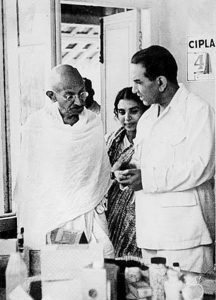 |
| KA And Yusuf Hamied created a successful multinational pharmaceutical company with a social conscience. |
KA Hamied had written in The Times of India on December 11, 1964 that patent law should enforce “compulsory licensing” to other manufacturers to prevent monopolistic predatory pricing.
Later, Yusuf picked up this same battle in the case of the astronomical pricing of AIDS medications by patent holders.
By retro-engineering the first medication and antiretroviral cocktail effective against HIV and AIDS and selling them at a fraction of the price, he helped saved millions of lives.
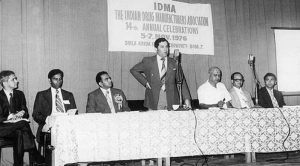 |
| Yusuf Hamied addressing the Indian Drug Manufacturers Association, 1976. |
Perhaps with the murders of his own grandparents and six million other Jews in mind, Yusuf has called Big Pharma “global serial killers,” “traders in Death,” and “death profiteers”.
He sees the lack of access to life-saving medication by poor people in the developing world due to cost as a form of “selective genocide in healthcare” driven by Big Pharma’s desire for profits.
This article was originally published on Café Dissensus Magazine and has been reproduced with permission.
Dr John McLeod holds a PhD in Indian history from the University of Toronto, and is Professor of History at the University of Louisville.
Dr Kenneth X. Robbins is a collector and independent scholar. He has curated more than a dozen Indian exhibits and five scholarly conferences.
Dr John McLeod holds a PhD in Indian history from the University of Toronto, and is Professor of History at the University of Louisville.
Dr Kenneth X. Robbins is a collector and independent scholar. He has curated more than a dozen Indian exhibits and five scholarly conferences.
The views expressed by this writer and commenters below do not necessarily reflect the views and policies of the Dawn Media Group.
